Protecting children from measles in drought-affected Somalia
27 June 2022 – When young Nastexo and Salmo developed high fevers, coughs, sore throats, runny noses and watery eyes, Ilmo may not have known exactly what problem her children had, but their rashes gave it away. Ilmo, who lives in a drought-affected location in Baidoa, knew her children had measles as she had seen many cases recently and had learnt to look out for these symptoms.
Ilmo felt helpless and tired when they both fell sick with this highly contagious disease, as they needed her undivided attention. Upon receiving advice from community health workers, she took Nastexo and Salmo to a health facility nearby where a doctor gave them vitamin A to boost their immunity and medication to give them relief.
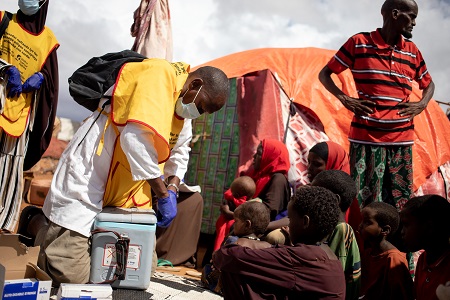 Health workers use vaccine carriers to store measles vaccines at the optimum temperature while visiting children to vaccinate them during house-to-house visits in the Istanbul IDP camp in Kismayo, Jubbaland state (April 2022). Credit: WHO Somalia/AreteIn collaboration with the Federal Ministry of Health and Human Services and partners, the World Health Organization (WHO) is supporting the work of 2163 community health workers who visit around 300 000 households every month across Somalia to look out for sick children in the households whose parents do not visit the health centres to seek health care for their sick children owing to myriad of reasons. These community health workers, deployed by WHO in the worst affected areas, look for sick children with suspected measles, pneumonia, diarrhoea or suspected cholera and malaria. They also screen children for signs of acute malnutrition using mid-upper arm circumference measuring tapes and search for other unusual health events in the community. This regular search helps communities to seek health care in a timely manner, which saves lives.
Health workers use vaccine carriers to store measles vaccines at the optimum temperature while visiting children to vaccinate them during house-to-house visits in the Istanbul IDP camp in Kismayo, Jubbaland state (April 2022). Credit: WHO Somalia/AreteIn collaboration with the Federal Ministry of Health and Human Services and partners, the World Health Organization (WHO) is supporting the work of 2163 community health workers who visit around 300 000 households every month across Somalia to look out for sick children in the households whose parents do not visit the health centres to seek health care for their sick children owing to myriad of reasons. These community health workers, deployed by WHO in the worst affected areas, look for sick children with suspected measles, pneumonia, diarrhoea or suspected cholera and malaria. They also screen children for signs of acute malnutrition using mid-upper arm circumference measuring tapes and search for other unusual health events in the community. This regular search helps communities to seek health care in a timely manner, which saves lives.
Hunger setting the stage for measles spread
The ongoing drought in the Horn of Africa, which WHO recently classified as a grade three health emergency – meaning that it is a severe crisis – is leaving children weak, hungry and susceptible to disease. Out of 6.1 million people across the country who are food insecure, nearly 1.7 million are suffering from extreme levels of hunger. An estimated 1.4 million children aged under 5 and more than 250 000 pregnant and lactating women will need treatment and care for malnutrition.
From the beginning of the year until week 21 of 2022 (29 May 2022), health facilities and community health workers reported 9562 suspected cases of measles, 7650 (80%) of whom are aged under 5 years. The highest number of cases have been reported from Puntland, South West State and Banadir.
“We are going extra miles to reach out every child whose life can be saved and protected by measles and other vaccines. During the last 4 months of our intensified operation in the ground, over 92 000 children have been vaccinated against childhood vaccines including measles through our outreach services which we have supported and continue to support in the drought-affected districts. Approximately 19000 of these children were identified by our health workers as “zero dose children”, meaning that they have not received any vaccine in their life span. Unvaccinated children, coupled with malnutrition and mass displacement, will set the stage for diseases like measles to spread. Therefore, we are reaching to every child in these drought-affected districts and vaccinate them against measles and other childhood vaccines. In order to continue to maintain our life-saving interventions, we will need US$ 35 million to ramp up our operations until the end of 2022,” said Dr Mamunur Rahman Malik, WHO Representative to Somalia.
Realizing the benefits of vaccination
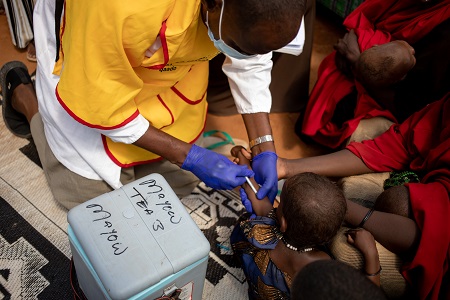 Ali Aden, a health worker, vaccinates children against measles at the Istanbul IDP camp in Kismayo, Jubbaland state (April 2022). Credit: WHO Somalia/AreteIlmo explains that she never had the chance to take Nastexo and Salmo for their childhood vaccinations, but now knows how important it is to vaccinate children. She explains that she will take the newest addition to the family, her 7-month-old baby, to receive routine childhood vaccinations to prevent him from falling sick like his siblings.
Ali Aden, a health worker, vaccinates children against measles at the Istanbul IDP camp in Kismayo, Jubbaland state (April 2022). Credit: WHO Somalia/AreteIlmo explains that she never had the chance to take Nastexo and Salmo for their childhood vaccinations, but now knows how important it is to vaccinate children. She explains that she will take the newest addition to the family, her 7-month-old baby, to receive routine childhood vaccinations to prevent him from falling sick like his siblings.
The ongoing drought in Somalia is taking a toll on the livelihoods and health of millions of Somalis. As casual labourers, Ilmo and her husband do not earn much. Since the drought began, they have found it even harder to find jobs to make a living, and now with two children unwell, they were recently forced to live on one meal a day. Ilmo’s children were lucky enough to get attention, but there are children who do not receive timely support, as well as more families that are plunged into poverty as a result of trying to address their health needs.
WHO and Ministry of Health build on innovation to create climate-resilient environmentally friendly health systems
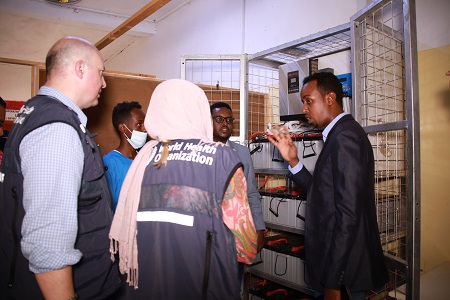 The high-level mission views the solar-powered medical oxygen plant in Dhushamareb, Somalia in June 2022. Photo credit: WHO Somalia.
The high-level mission views the solar-powered medical oxygen plant in Dhushamareb, Somalia in June 2022. Photo credit: WHO Somalia.
Mogadishu, 26 June 2022– From 13 to 17 June 2022, the Federal Ministry of Health and Human Services and the World Health Organization (WHO) country office for Somalia hosted a technical mission from WHO headquarters and Regional Office for the Eastern Mediterranean, comprising experts from the new Innovation Hub team, as well as the Environment, Climate Change, and Health team. The mission aimed to bring together key partners, including United Nations agencies, nongovernmental organizations and donors, to explore and advocate for ways to reinforce the Somali health system using climate-friendly solutions, such as the use of solar power for delivering oxygen and electrifying health facilities, especially in remote and hard-to-reach locations.
The global climate crisis, identified as the single largest health crisis facing humanity today, has resulted in an extreme phenomenon of droughts and floods occurring on an annual basis in Somalia. Meanwhile, the ongoing drought has left Somalia on the brink of famine, with a sobering 6.1 million people food insecure and 1.7 million people suffering from extreme levels of hunger.
Coupled with high rates of indoor air pollution, caused by the use of fossil fuels in households, and air temperatures which are estimated to be rising every year, these conditions are brewing an inescapable health storm in an already fragile country.
WHO has installed 3 solar-powered medical oxygen systems in Dhushamareb, Baidoa and Kismayo. The first plant, set up early in 2021 in Dhushamareb, paved the way for replication and possible expansion, as there was a survival rate of 96% in children who were admitted in this hospital with birth asphyxia, pneumonia and other medical conditions that required immediate oxygen therapy. These children may have otherwise lost their lives without access to high-grade medical oxygen provided by this innovative system.
“During our innovative journey to improve medical oxygen access, we discovered that the necessity for a reliable source of electricity can be met using solar power. Innovation can make this feasible and sustainable in Somalia. Therefore, we are now considering the possibility of using solar power to provide enough electricity to power entire health facilities – from medical oxygen and refrigerators for vaccines, to incubators, lighting and operating theatres,” said HE Dr Fawziya Abikar Nur, the Minister of Health and Human Services, the Federal Government of Somalia.
After a visit to the solar-powered oxygen plant in the Hanano Hospital in Dhushamareb, the Director a.i., Department for Digital Health and Innovation and Unit Head, at the WHO Innovation Hub, Louise Agersnap, urged partners to reflect on the situation in Somalia. “What makes a pregnant woman travel for hundreds of miles to deliver a baby that she can hold? It is that “lighthouse” of a hospital that has reliable, solar-powered electricity that can secure a safe birth,” she said. “Innovation is a tool to solve problems, and in this case, we solved many in one shot. Somalia is leading the way, and we at the WHO Innovation Hub are proud to collaborate with the Government and WHO country team. Their innovative use of solar power is bringing multiple wins to the country – it is saving lives; saving health care costs; and saving the environment as it uses green, renewable energy.”
“Delaying action would be denying action,” said Salvatore Vinci, WHO Sustainable Energy Advisor. “We must act now to support more health facilities to access power through solar energy. Somalia makes the best case for investment in solar energy in health centres ─ with hours of sunshine, limited and expensive electricity, as well as hospitals without reliable power."
While explaining how the electrification of facilities could be useful, WHO’s Technical Lead and Unit Head of Air Quality, Energy and Health, Heather Adair-Rohani, said, “Electrifying health care facilities with solar energy can ensure access to quality essential services for women and children, promote the uptake of health care services, cut health care costs, all the while protecting our climate.”
Dr Mamunur Rahman Malik, WHO Representative to Somalia and Head of Mission emphasized, "There is no alternative for oxygen. Pneumonia is one of the most common causes of child deaths in Somalia. Every child and every human have the right to breathe clean air, drink clean water and access good-quality health services. It is incumbent on us all to ensure every Somali has access to these basic human rights, using innovative and climate-friendly solutions.”
For additional information, kindly contact:
Khadar Hussein Mohamud, Head of Coordination and Communications, Ministry of Health, Federal Government of Somalia,
Abdirahman Ahmed Ali, Communication Officer, Ministry of Health, Federal Government of Somalia,
Fouzia Bano, WHO Somalia Chief of Staff ai, Communications Officer,
Kyle DeFreitas, WHO Somalia External Relations Lead,
Note to editors
The Global Action Plan for SDG3 (SDG3-GAP), comprising 13 agencies, Grand Challenges Canada, and an innovator, Dr Michael Hawkes, provided support to the first solar-powered oxygen plant in Dhushamareb.
Please visit the following links for additional information:
How a gloomy night brought a bright light in the fight against COVID-19
Every breath counts: utilizing the COVID-19 response to increase access to oxygen
Solar-powered oxygen delivery in Somalia: the vital need beyond COVID-19
Historical moment for Somalia as COVID-19 vaccines arrive through COVAX Facility
WHO EMRO | Quarterly technical programme updates | Information resources | Somalia site
Building back better to boost childhood immunization, in the midst of a severe drought
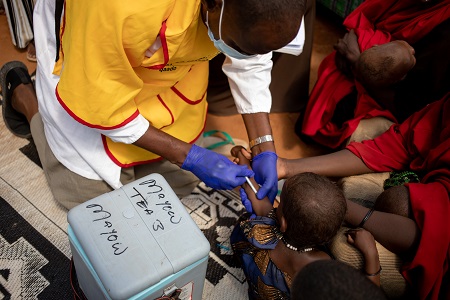 A skilled health worker vaccinates a child at a camp for the internally displaced persons in Kismayo. Credit : WHO Somalia/Arete
A skilled health worker vaccinates a child at a camp for the internally displaced persons in Kismayo. Credit : WHO Somalia/Arete
20 June 2022 – The promise of primary health care, and one of the main premises of universal health coverage is to promote good health for everyone, everywhere, including during dire health emergencies. In Somalia, the World Health Organization (WHO) is leveraging its response to the ongoing drought, the worst of its kind in 4 decades, to build back better. This means building more efficient health systems that reach more and more people equitably, delivering timely services without putting anyone through further financial hardship.
Setting up outreach vaccination sites to access communities in need
After noting the limited uptake of COVID-19 vaccination in health facilities across the country, WHO, the United Nations Children’s Fund (UNICEF) and partners supported the federal and state health ministries to set up outreach vaccination sites in the country. These sites aim to take services to the people, especially those who do not visit the health centres, to accelerate vaccination in order to protect more people from diseases in Somalia.
Building on the success of this intervention, WHO supported the same strategy to vaccinate children against common childhood diseases and childbearing women against tetanus. Children receive vaccines to shield them from childhood tuberculosis; diphtheria, tetanus, and pertussis (DTP); polio; hepatitis B; haemophilus influenzae type B; and measles. Additionally, outreach teams provide vitamin A, oral rehydration salts, tetanus vaccination, and consultation with required medication to communities.
Children who have never received vaccines before are benefiting
Since the onset of the drought last year, through 239 outreach sessions conducted per week in 35 districts, more than 11 000 children with diarrhoeal disease have been treated with oral rehydration salts and zinc.
Consultations at the outreach services have benefited 39 412 people aged over 5 years and 38 068 children under 5 so far. Over 29 000 zero-dose children have been identified, and received their first vaccines, and over 52 000 children have been vaccinated against measles through these outreach services being offered to marginalized communities and those living in hard-to-reach areas.
As the COVID-19 pandemic has already had a negative effect on routine childhood immunization, integrated outreach sessions have significantly boosted immunity in children who would have otherwise missed the chance to get protected against diseases. By reaching out to communities, including vulnerable ones during the ongoing drought, Somalia is taking steady steps towards delivering on its promise to offer essential health services to all.
Stepping up humanitarian operations for drought: cholera vaccination campaign rolled out to protect over 900 000 Somalis in drought-affected districts
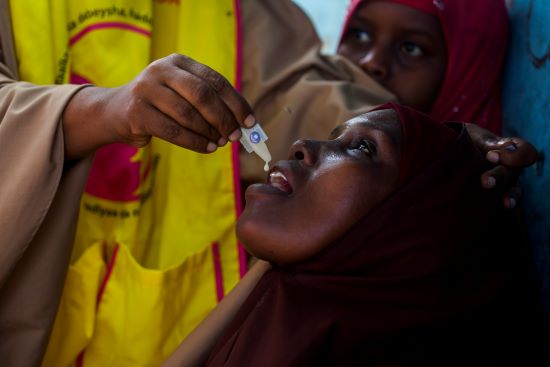 WHO Somalia/Fouzia Bano14 June 2022, Mogadishu – On 14 June 2022, Somalia rolled out the first round of a five-day campaign to vaccinate 934 511 people against cholera in nine high-risk districts that are currently facing ongoing outbreaks of cholera. The World Health Organization (WHO) and United Nations Children’s Fund (UNICEF) are supporting the Ministry of Health and Human Services, Federal Government of Somalia, to conduct the campaign. Gavi, the Vaccine Alliance, is providing vaccines and funds to implement this life-saving intervention.
WHO Somalia/Fouzia Bano14 June 2022, Mogadishu – On 14 June 2022, Somalia rolled out the first round of a five-day campaign to vaccinate 934 511 people against cholera in nine high-risk districts that are currently facing ongoing outbreaks of cholera. The World Health Organization (WHO) and United Nations Children’s Fund (UNICEF) are supporting the Ministry of Health and Human Services, Federal Government of Somalia, to conduct the campaign. Gavi, the Vaccine Alliance, is providing vaccines and funds to implement this life-saving intervention.
The oral cholera vaccination campaign aims to vaccinate people above one year of age, including pregnant women and internally displaced persons. It will be conducted in Hodan, Daynile, Dharkeneley, Wadajir, Jowhar, Baidoa, Afgoi, Wanlaweyne and Marka districts.
Since 2017, Somalia has witnessed several cholera outbreaks. These can be attributed to a large number of people having poor access to safe water and sanitation services, and natural hazards, including drought and floods, further exacerbated by protracted conflict and large-scale population displacement. Meanwhile, the ongoing drought in the country has had a grave impact on Somalis – while displacing over 770 000 people internally, it has dried up surface water sources and led to food insecurity in communities, which increases the risk of cholera infection as well as other waterborne diseases.
An estimated 49% of the population – 7.7 million people – require some form of humanitarian or protection assistance in Somalia, of whom 6.13 million are estimated to be affected by the current drought.
While cholera remains endemic in Somalia, and the current drought situation may have exacerbated the risk of a major outbreak across the country, vaccination against cholera with two doses given between 2 to 4 weeks apart is seen as a supplementary measure to stop the outbreak and control its spread. In addition, other proven and effective public health measures also prevent cholera transmission, such as maintaining good personal hygiene, improving access to safe water and practicing safe sanitation.
“To prevent cholera outbreaks in a sustainable way, we strongly advise affected communities to take two doses of cholera vaccine orally. In addition, we are urging our partners to assist us in improving access to water, sanitation, and hygiene facilities for vulnerable communities and the general public,” said H.E. Fawziya Abikar Nur, Minister of Health and Human Services, Federal Government of Somalia.
“While we need to step up our collective response to cholera and other waterborne diseases, especially in the areas of case management, we have over 2100 community health workers deployed in 78 districts, including in 24 drought-affected districts. They are carrying out risk communication activities at the household level to promote safe behavioural practices and maintain basic hygiene at personal and household level even in these trying conditions. These community health workers are also ensuring that sick children with profuse diarrhoea and vomiting and other signs of dehydration are immediately cared for and referred to nearly health centres for further assessment or treatment. These public health actions are saving lives from preventable causes, as populations, especially children, are very vulnerable during these emergencies, owing to hunger, starvation and malnutrition,” added Dr Mamunur Rahman Malik, WHO Representative to Somalia.
“Parents and caregivers can take life-saving preventive measures for their children by taking them to get the cholera vaccine drops. Children are very susceptible to preventable diseases like cholera, especially with low access to water during this drought,” said Angela Kearney, UNICEF Somalia Representative.
“Together, we are ensuring that 1 869 022 doses of the cholera vaccines are readily available for the campaign while social mobilizers educate affected communities. Vaccination alone is not enough, preventive measures such as good hygiene and access to health care are important.”
As of 15 May 2022, 4887 suspected cases of cholera, with 16 associated deaths, had been reported from 21 drought-affected districts in Somalia. Around 62% of these cases were children aged below five years, while around half of the cases were females.
A second round of the oral cholera vaccination campaign will be conducted within a few weeks following completion of the first round of the oral cholera vaccination campaign. The populations that received the first dose will be targeted to receive the second dose during the next round of the campaign to boost the affected population’s immunity.
------
For additional information, kindly contact:
Khadar Hussein Mohamud, Head of Coordination and Communications, Ministry of Health, Federal Government of Somalia,
Mukhtar Abdi Shube, Head of the Expanded Programme on Immunization (EPI) section, Ministry of Health, Federal Government of Somalia,
Fouzia Bano – WHO Chief of Staff ai, Communications Officer,
Lisa Hill – UNICEF Communications Specialist,


